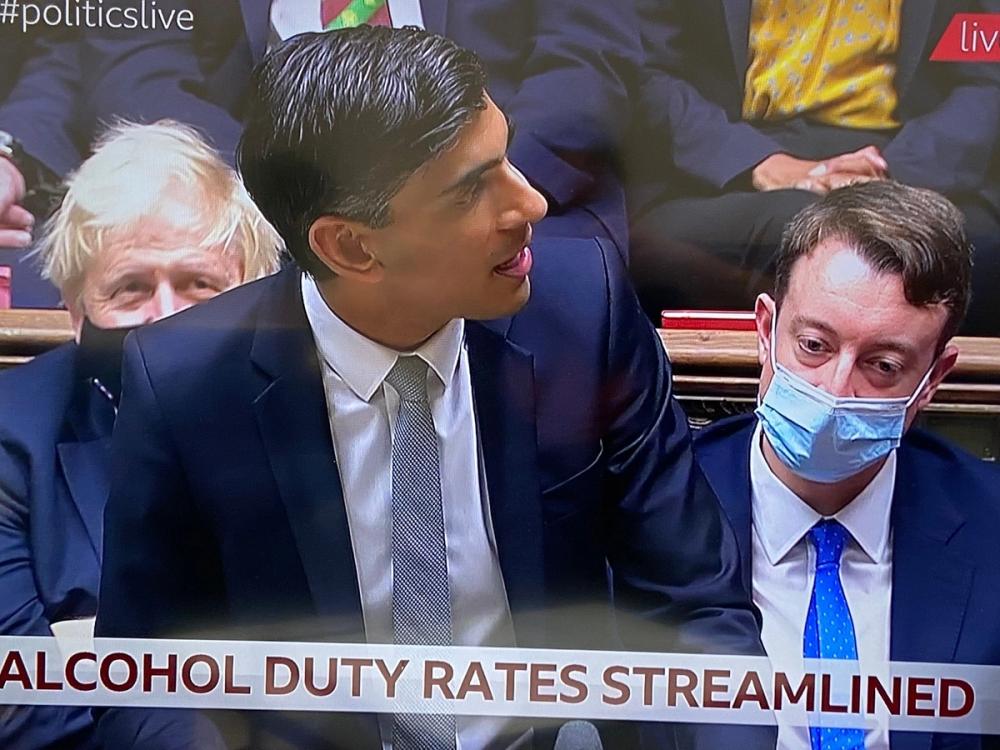In 2024 the UK imported over one and a quarter billion litres of wine. That’s the equivalent of nearly 1.7 billion 750 ml bottles – not bad for a small island famous perhaps more for its beer and distillation heritage than for wine. But dig a little deeper and there is indeed a rich history of importing wine into the UK dating back to at least the 12th century.
Today’s wine industry, from domestic producers, through to importers, wholesalers, bottlers, warehouses, wine storage facilities and retailers – both multiple and independent - together with the fine wine trade make a significant economic contribution to the UK economy.

WSTA's chief executive Miles Beale was able to set out the clear and present dangers facing the UK wine and spirits industry at this week's London Wine Fair
Those businesses account for £33 billion in economic activity. They contribute £8.9 billion in total GVA (Gross Value Added) to the UK economy and support nearly 200,000 FTE employees. In short, we’re an economically significant sector - and we’ve perhaps been too modest about telling the story of those businesses and promoting the economic importance to the wider UK economy.
For example, I wonder how many people appreciate the scale of the UK’s bottling facilities? In 2024 the UK imported almost 500 million litres of still wine in bulk, which was packaged in the UK – not just bottled - but packaged into bag-in-box, cans and other formats.To put that total volume in context that’s more than the annual production of wine from Bordeaux.
Not only does bulk shipping create jobs and value added to the UK economy but the carbon savings are astonishing. Bulk shipments from Australia and New Zealand alone in 2024 saved 25,000 tonnes of CO2 compared to those same volumes being shipped in bottle.
It’s not just state of the art bottling plants – from fine wine merchants and trading platforms, specialist importers and specialist wine storage facilities - there is a whole unseen infrastructure supporting the trade of which most consumers are blissfully unaware.
Then there’s a new and thriving domestic wine sector, growing from strength to strength and punching above its weight in terms of contribution to GVA. Now that looks good in the shop window – very good.
It’s also worth remembering that fully 98% of the £8.9bn in GVA comes from imported wine – so it’s when we talk about the size, scale and value of the UK wine industry that we understand that means businesses across the whole of the supply chain up to and including retail and hospitality.
Preparing the future
So that’s my quick attempt at a painting by numbers. A very quick sketch to set out the scale and scope of the UK wine trade.
So if that’s the backdrop - a reminder of the UK’s relative size, weight and concentration in wine terms – what of the present, what of the future? And this brings me to what I want to tackle today: making sense of seismic change.
Over the nearly 13 years that I’ve been at the WSTA, and have been asked to address the London Wine Fair, it’s become an important opportunity for me to reflect on key issues and challenges facing our sector.
Since 2016 those challenges have been almost exclusively a succession of dominant, single issues: preparing for and dealing with the aftermath of Brexit; the impact of and recovery from Covid; the UK’s review of excise duty; and ensuring our voice is heard by a new UK government.
The 2025 agenda
In 2025 it all looks so very different. Geopolitical tensions across the globe are as heightened now as ever in recent memory, the risk of a global trade war has spooked the markets, undermined confidence and reduced forecasts for growth.And established political orthodoxy is increasingly being questioned – most recently in local elections in UK, but also elsewhere in Europe and beyond. And I haven’t even mentioned wine yet...
I think that it can feel quite overwhelming. I’m reminded of Uncle Theodore in Evelyn Waugh’s Scoop, who every day is heard singing under his breath - “change and decay in all around I see” - in anticipation of the arrival of the morning papers. Fast forward to 2025 with 24 hour rolling news, phone alerts and never-sleeping social media replacing daily newspapers – the sense of constant change, chaos and foreboding at times feels overwhelming.
There’s certainly a multitude of issues that are threatening to disrupt the trade in wine at global, regional and national level.I’m not going to run through a list of them all but want to reflect on a couple of the most important.
Global trade

The impat of President Trump's tariffs are still reverberating around the global wine industry
Let’s start with global trade: one of the issues dominating the headlines for the past few months – or more specifically since January 20th.
Over the last decade or so free trade has become something of a dirty word, but talk of the end of globalisation is, I believe, exaggerated. Yes, the dawn of a new protectionist era represents the end of a particular model of globalisation. A model that sets out a liberal utopia in which all barriers – to movement of goods, people and money – are broken down.
But let’s face it – unfettered global free trade, free from the dead-hand of government – has always been more an ideology rather than a realistic end point. And an ideology that has been on its way out ever since the global financial crisis of 2008 when governments were required to intervene.
And before we blame it all on Washington let’s not forget that the EU needed a couple of attempts to get its trade deal with Canada ratified.More recently there has been significant opposition to the EU’s deal with the Mercosur block all because certain sectors – often including the agriculture sector – felt that the deals would lead to an influx of cheaper imported products undermining domestic production.
Ultimately though, all that was needed was one final straw, which Washington has just administered, to break the creaking global free trade model. The arguments we’ve heard from the US about globalisation undermining domestic production - whether that’s agriculture, steel, cars or indeed pharmaceuticals - are not new.
So, we appear to be heading inexorably to a model where migration will be restricted, supply chains will be shorter, hands-on, ‘winner-picking’ industrial strategies will be back in favour and trade barriers will be removed only slowly.
A different trade model for sure, but I don’t share the view that the world has fundamentally changed. It’s more that governments and blocs need to develop a more coherent response to the failings of the past and not simply to fall back on the idea that the global free market was a force of nature that could not – and should not – be interfered with.
And as I mentioned earlier – this is not new. The failings of the liberal trade model – slow growth, rising inequality, the hollowing out of manufacturing – have been evident since Bruce Springsteen sang about the impact on communities in the US rust belt in the 1980s.
New beginnings

Miles Beale sets out his vision for what the wine and spirits industry needs to do to "change" to cope with and get on top of political intervention
Let’s look at the response from the rest of the world to recent events. It is no coincidence the long-awaited UK and India free trade agreement was signed recently. Its shape has been clear for decades, but I genuinely don’t think this would have got over the line without the actions of the second Trump administration.
That’s inevitably the shape of things to come – more bilateral agreements and more agreements with other trading blocs, such as the Comprehensive & Progressive Trans-Pacific Partnership (CPTPP) the Gulf Cooperation Council (GCC) etc. And let’s see what comes from the UK an EU summit this week - and whether the much-hyped reset will be just that - and not simply a thawing of relations.
So the international trading system isn’t broken – but it has changed. “Gradually and then suddenly” as Hemingway once put it [The Sun Also Rises, 1926]. And It’s continuing to evolve - as it has for centuries.
And that’s not to say that adjusting to a new global trading environment isn’t going to be easy or painless.
The International Monetary Fund has downgraded the UK's growth forecast for 2025, reducing it from 1.6% to 1.1%, blaming global trade disruptions stemming from US tariff increases, which are expected to stifle UK economic activity.
Those projections came before the announcement of the UK/US agreement and the pausing of tariffs over 10% for a number of countries – most notably China. The pendulum is still swinging, and it may take a number of months to find its new point of equilibrium. But it’s certainly changed global trading landscape. The ‘rules-based’ order has been undermined. Tariffs are back. So are bilateral and smaller trade deals.
What does it mean for us?

The WSTA senior team at London Wine Fair: Miles Beale, Simon Stannard and David Richardson
So what does this mean for us, the UK wine trade? I think it’s fair to say that the wine trade will be more affected by any disruption to the wider economy - such as stifled growth and reduced business and consumer confidence - than from the direct effects from any changes to tariffs. As things stand somewhere between 85-90% of wine coming into the UK does so tariff free and that’s not set to change. For the UK wine sector, non-tariff barriers have often had a greater impact than tariffs.
Take for example the non-tariff barriers resulting from inherited EU production rules that tend to favour EU wine production over production from elsewhere in the world. Those rules simply don’t work for a market that imports 99% of its wine split almost equally between EU and non-EU.
I was pleased the previous UK government launched an ambitious plan to reform those rules to level the competitive playing field and I hope the outcome of this week’s EU/UK Summit will allow this government to see through the final set of reforms and help stimulate investment in the UK supply chain.
And while we’re looking at how to do things differently in a changing world, then regulators should be open to drawing on best practice across the globe. For wine, the World Wine Trade Group’s model of mutual acceptance of wine making practices is, I believe, best in show as far as trade facilitation goes. The government should delay no more and join – something the WSTA has been calling for since we left the EU. It’s a trick we can no longer afford to miss.
And as we approach the first anniversary since the UK’s election last July, so it’s right to focus down from the global level to national level. If the government is truly serious about its plans to grow the economy, then it will need to work harder to overcome the prevailing headwinds.
To be brutally honest, it’s about time we saw some hard evidence of its commitment to economic growth. The political soundbites about growing the economy are beginning to ring hollow in the absence of concrete actions with measurable benefits.
Businesses in the alcohol retail and hospitality sectors - and especially those that supply them - feel ignored at best. At worst, they feel they have been deliberately targeted.
Over and above recent, business-unfriendly changes to the National Minimum Wage, Employers’ National Insurance Contributions and cuts to business rate relief, wine and spirits businesses have been hit more often and harder. It’s time for government to listen. To acknowledge our concerns. To take action. Because it’s not us vs them, it should instead be all hands to the pump to drive new economic growth.
Government brick wall

The drinks industry is now facing the full effect of Rishi Sunak's duty system dreamt up during his time as Chancellor and now fully implemented by the Labour government
Now, I don’t intend to re-open old wounds, but I remain astonished that this government pressed ahead with the final stage of excise duty reforms designed by Rishi Sunak when he was Chancellor. We said that losing the easement mechanism would result in higher prices and less choice for UK consumers - and that’s proven to be the case. Cold comfort to have been proved right.
But it highlights an opportunity missed and is one of many examples of where the government’s actions don’t chime with the rhetoric. The Prime Minister and Chancellor talk of cutting red tape, yet they had the opportunity to avoid imposing huge administrative costs on UK businesses - and chose not to. More cost, more red tape, less growth.
Spectre of EPR
Moving on to packaging waste regulations, the WSTA, along with businesses and associations from across the alcohol and retail sectors, have led calls for the Government to delay the introduction of Extended Producer Responsibility (EPR) charges - until those charges are known. As things stand businesses will be facing a bill in October – of an as yet unknown amount, for which they have already had to accrue… somehow! How can businesses possibly plan?
Energy costs and currency fluctuations can be hedged - but with EPR it’s wholly different.I heard someone describe the predicament as similar being asked to work from April but not knowing the salary yet having to manage outgoings for six months hoping that the salary when confirmed will cover those costs. It’s non-sensical. More costs, green tape, less growth.

The roll out of EPR has left everyone in the industry blindsided
As I’ve said before, it’s not that we oppose the principle that those placing waste packaging on the market should pay for the costs of collection and recycling. It’s just that if those businesses are being asked to pay, they should have confidence in the final scheme and more say in its development. That’s certainly not the case as things stand. Cost without consultation is no recipe for economic growth.
But whether we’re talking about Extended Producer Responsibility, Deposit and Return Schemes, or unfinished wine reforms - including making it easier to produce lower, low and no alcohol products - the government needs to take the time to understand fully how its actions will impact on businesses across the UK. There is talk of less government and cutting the number of civil servants. As a former civil servant I would much rather hear talk of improving the quality of government - it’s not about size, Sir Keir, it’s about what you do with it!
Achieving economic growth requires government with a better understanding of business, which brings me back to where I started – the economic significance of the wine industry to the UK economy. 98% of the £8.9 billion in GVA the UK wine sector creates comes from operations other than UK wine production – yet the businesses that contribute the vast majority of that GVA feel they are being overlooked.
Need to be heard
The government is expected to publish its industrial strategy in June, focusing on eight sectors it has identified as offering the highest growth opportunity for the economy and business. The food and drink sector is not one of those eight. Fine perhaps, but focusing on those priority sectors must not come at the expense of other sectors.
If the government is to drive growth it has to come from across the economy, across all sectors and from across the whole of the UK.
It’s time for government to recognise what government can do to help businesses in our sector thrive. Government needs to listen actively and take the time to consult while plans are being developed - not simply as an afterthought. Otherwise businesses are going to slip into terminal decline through neglect – whether or not that neglect is malignant.
Proper partnership working as we see in other parts of the world can result in mutually beneficial outcomes and will help maintain the UK’s place as a global hub for the wine trade. In so doing we can help to deliver the government’s growth agenda. I would go as far as to say that without proper consultation – and during times of such change - future economic growth will remain a mirage.
None of this is rocket science. Yes, the world looks different now than it did a year ago, but many of the challenges can be overcome or adapted to. Yes, there are multiple challenges facing the wine industry, but again those challenges can be overcome with successful collaboration at international and national level - providing regulators are prepared to listen.
So back to Uncle Theodore. I only half agree with him. Change is all around us – but not decay. We’re a sector that has shown it can adapt. We did so after 2016. We did so during and after Covid. In fact, we have done so over and over since the 12th century. And we can change again.
Provided we are afforded the right environment, provided we are given the right support, provided we are presented with the right opportunities and in which to thrive. And thrive we will.
* You can find out more about the WSTA and what it is doing to support the drinks industry here.






























